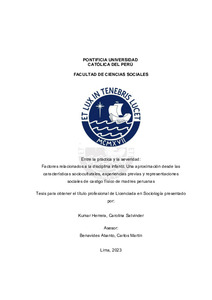| dc.contributor.advisor | Benavides Abanto, Carlos Martin | |
| dc.contributor.author | Kumar Herrera, Carolina Satvinder | |
| dc.date.accessioned | 2023-06-20T19:11:55Z | |
| dc.date.available | 2023-06-20T19:11:55Z | |
| dc.date.created | 2023 | |
| dc.date.issued | 2023-06-20 | |
| dc.identifier.uri | http://hdl.handle.net/20.500.12404/25238 | |
| dc.description.abstract | Una encuesta realizada en el 2017 mostró que la mayoría de peruanos tiene
una actitud positiva hacia la obediencia de los niños, lo que llevaría implícito cierta
normalización de la disciplina y el uso de castigos como medios para formarlos. En
ese sentido, la presente investigación busca evaluar, desde una perspectiva
cuantitativa, la influencia de las características socioculturales, experiencias previas y
representaciones en torno al castigo físico de madres peruanas en las prácticas de
crianza en relación a la disciplina en el 2021, usando datos de la ENDES. El marco
conceptual planteado aborda la relación entre los conceptos mencionados, partiendo
de la noción de habitus de Bourdieu. Se ejecutan dos modelos de regresión logística
binomial, uno relacionado a las prácticas de castigo físico para comprobar la hipótesis,
y otro a las prácticas de castigo físico severas, para verificar la robustez de los
hallazgos, siempre controlando por las mismas variables. Los resultados muestran
que las prácticas de castigo físico se construyen, por una parte, por las características
socioculturales, por otra, por las experiencias de castigo físico, y también, por las
representaciones del mismo. Se concluye diciendo que son factores de riesgo un
menor nivel socioeconómico o educativo, el haber experimentado castigos físicos, o
tener representaciones positivas del mismo, pues aumentan la probabilidad, por un
lado, de usar castigos físicos, y por otro, de usar castigos físicos severos, como parte
de las prácticas de crianza. Adicionalmente, se proponen recomendaciones de política
para la implementación de programas enfocados en la prevención del castigo en la
infancia. | es_ES |
| dc.description.abstract | A survey made in 2017 showed that most Peruvians have a positive attitude
toward children’s obedience, which implies some normalization of discipline and the
use of punishment as a way to foster them. Thus, this study searches to analyze, from
a quantitative perspective, the influence of sociocultural characteristics, previous
punishment experiences, and social representations of physical punishment of
Peruvian mothers in their parental practices concerning discipline in 2021 using data
from ENDES. Using the concept of habitus from Bourdieu, the conceptual framework
approaches the relationship between parental practices, previous experiences, social
representations, and sociocultural characteristics. It executes two binomial logistic
regression models, one about punishment practices to prove the hypothesis suggested
and another one related to severe punishment practices to analyze robustness,
regarding the same control variables in each case. Findings reveal that punishment
practices are constructed, by one side, for sociocultural characteristics, by another, for
previous punishment experiences, and, by one else, for punishment social
representations. It concludes by saying that having a minor socioeconomic or
educative level, having experienced physical punishment or having positive social
punishment representations are risk factors because increase the likelihood, for one
side, of using physical punishment, and for another, of using severe physical
punishment as part of parental practices. Accordingly, some policy recommendations
for the implementation of programs focus on the prevention of child punishment. | es_ES |
| dc.language.iso | spa | es_ES |
| dc.publisher | Pontificia Universidad Católica del Perú | es_ES |
| dc.rights | info:eu-repo/semantics/openAccess | es_ES |
| dc.rights.uri | http://creativecommons.org/licenses/by-sa/2.5/pe/ | * |
| dc.subject | Maternidad--Perú | es_ES |
| dc.subject | Crianza de niños--Perú | es_ES |
| dc.subject | Disciplina de niños--Perú | es_ES |
| dc.subject | Castigos corporales--Perú | es_ES |
| dc.title | Entre la práctica y la severidad: Factores relacionados a la disciplina infantil. Una aproximación desde las características socioculturales, experiencias previas y representaciones sociales de castigo físico de madres peruanas | es_ES |
| dc.type | info:eu-repo/semantics/bachelorThesis | es_ES |
| thesis.degree.name | Licenciado en Sociología | es_ES |
| thesis.degree.level | Título Profesional | es_ES |
| thesis.degree.grantor | Pontificia Universidad Catolica del Peru. Facultad de Ciencias Sociales | es_ES |
| thesis.degree.discipline | Sociología | es_ES |
| renati.advisor.dni | 07258309 | |
| renati.advisor.orcid | https://orcid.org/0000-0003-1609-6951 | es_ES |
| renati.author.dni | 71005009 | |
| renati.discipline | 314086 | es_ES |
| renati.juror | Sulmont Haak, David Jose Antonio | es_ES |
| renati.juror | Cavagnoud , Robin Thierry Florent | es_ES |
| renati.juror | Benavides Abanto, Carlos Martin | es_ES |
| renati.level | https://purl.org/pe-repo/renati/level#tituloProfesional | es_ES |
| renati.type | https://purl.org/pe-repo/renati/type#tesis | es_ES |
| dc.publisher.country | PE | es_ES |
| dc.subject.ocde | https://purl.org/pe-repo/ocde/ford#5.04.01 | es_ES |







